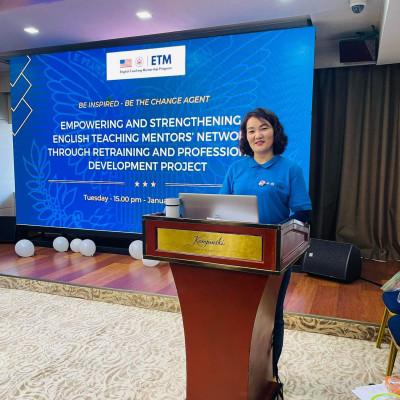Sessions / Location Name: Xreading
Physical Location
Location: 702
Implementing ER through XReading: Perceptions, Benefits and Challenges #4393
This presentation reports the preliminary results of an extensive reading (ER) program implemented using XReading, a subscription-based virtual library. Thirty-two students participated in a 9-week study as part of a college General English course in Taiwan. Using data from post-program questionnaires and focus group interviews, the study explores learners’ perceptions of XReading for ER and investigates ER’s impact on their attitudes towards reading in English, and perceived benefits and challenges. The study reveals that most participants responded positively to using XReading for the ER program. The findings indicate that learners generally perceived improvement in their overall reading ability, reading rate, vocabulary, and motivation to learn English. However, many failed to meet the reading goal due to time constraints, lack of interest, or selecting readers that were either too challenging or not to their preferences. Recommendations to enhance participation and guidance are discussed for better implementation of online ER programs.
Xreading: What’s New and What’s Next #4032
Xreading is digital library that gives students access to over a thousand graded readers from major publishers such as Cambridge University Press, Macmillan, and National Geographic/Cengage Learning. Students have unlimited access to all books as well as audio narrations, ratings, and quizzes. In addition, the system tracks students' reading progress (books read, words read, reading speed, quiz scores, etc.) so it makes management and assessment much easier for teachers. Since it’s launch is 2014, the system has been continuously evolving and growing in terms of the number of books and features. In this presentation, the founder of Xreading will explain the new functionality that has been added over the past year, and what is planned for the future including our new textbook series and COIL project. Current users of the system are encouraged to provide feedback and suggestions based on their experience.
Fictional Graded Readers Boost Academic Word Knowledge: Fact or Fantasy? #4119
Extensive reading is often omitted from EAP programmes because of the lack of suitable materials. In particular, materials used in EAP programmes should include salient academic vocabulary, while being of interest to students. Fortunately, a series of graded readers that addresses both of these requirements has recently been developed. 'My Mysterious Friend Sora' is an engaging, exciting, and often poignant story that follows the life of a university student and her unusual friend, Sora. The story ‒ which spans 10 graded readers ‒ includes the systematic recycling of all 570 items from Coxhead’s (2000) academic word list. In this session, the presenter will discuss the vocabulary gains made by the students who read the series as well as the feedback provided by students. Finally, the potential usefulness of the series (which is available on Xreading) in other teaching and learning contexts will also be discussed.
Correlating Reading Speed and Words Read with IELTS Scores: A One-year Study #4099
This presentation examines extensive reading (ER) speed and words read by students at a Japanese university using a digital ER platform called Xreading and compares them to standardized test reading performance using the International English Language Testing System (IELTS). The presentation reports the year-end results for first- and second-year students who participated in ER in a year-long academic reading and writing class. The data combines quantitative data on reading speed and words read with their IELTS reading performance over two testing points during the academic year. The findings indicate significant reading progress in reading speed and words read. Total words read showed a moderate correlation with IELTS reading scores; however, no significant correlation was found between increased reading speed and IELTS reading score changes across semesters. Based on the findings, the presentation concludes with future implications to improve and streamline the ER program for better results and participation.
From Pages to Habits: Student’s Journey in an Extensive Reading Course #4122
The study examines the impact of an Extensive Reading (ER) program for first-year English Department students at a tertiary education institution in Indonesia. Research has found that developing independent reading habits is crucial in foreign language learning, yet many first-year English department students struggle to transition from required reading to self-directed reading for pleasure. To address this challenge, ER is integrated into the curriculum as a compulsory course for first-year English department students. The case study investigates how a one-semester ER course influences the reading habits and experiences of a cohort of first-year students. It examines data from 150 students, using ER self-reflection reports, reading history logs from the digital platform Xreading, and interviews to gain information on the evolution of the student's reading habits. The expected findings will reveal patterns in their reading habits, challenges they encounter, and the role of the digital reading platform in shaping their experiences.
Effective Actions Bridge the Gaps Between Policy & Practice #4394
Since the late 1990s, the acquisition of foreign languages—particularly English—has garnered significant attention both globally and within the Mongolian educational context. Despite this growing interest, achieving successful outcomes in English language learning remains challenging and, at times, stressful, often resulting in limited progress. In Mongolia, the need for effective English language teaching and learning strategies has become increasingly urgent. While national policies outline clear expectations for English proficiency, classroom realities often reveal a gap between these standards and practical implementation. Many students lack access to tools that facilitate the active use of English, including vocabulary development and reading practice. This paper explores effective practices in Extensive Reading (ER) activities that align with standardized English instruction. It argues that digital platforms such as Xreading.com play a vital role in bridging the gap between policy goals and classroom practices.
Fostering Motivation in Avid and Reluctant Readers through XReading #4140
Extensive Reading (ER) has been widely recognized for its benefits in enhancing reading comprehension and motivation. With the growing integration of technology in ER programs, digital reading platforms such as XReading have emerged as valuable tools for engaging learners. While previous research has largely focused on the experiences of highly motivated readers, studies comparing avid and reluctant readers remain scarce. This study explores how XReading can foster Directed Motivational Currents (DMCs) among both reader types, providing insights into factors that influence their engagement with ER. By employing a mixed-methods approach, the study investigates the role of digital reading platforms in sustaining long-term motivation and proposes inclusive strategies to support learners with varying levels of reading commitment. The findings contribute to the ongoing discourse on technology-assisted ER and offer pedagogical implications for designing more effective and inclusive reading programs.
Supporting Students' Reading Skills in Rural Areas with E-Library Resources #4421
In rural areas, students face significant challenges in developing their English language skills due to limited opportunities for participation in extracurricular programs, clubs, and circles. These constraints restrict their ability to engage in additional learning and growth. However, the X-Reading e-library provides a valuable solution by offering a platform that allows students to improve their English skills at their own pace. This digital library gives students access to books tailored to their language level and personal interests, fostering a love of reading while enhancing comprehension and vocabulary. Furthermore, the platform encourages active involvement from parents and guardians, enabling them to track their child’s progress and support their learning journey. By integrating the X-Reading e-library into rural education, students gain the opportunity to develop their English language skills independently, fostering more equitable learning opportunities and promoting lifelong learning.
ER Program at a Higher Vocational College with Limited Support and Resources #4080
In this presentation, I will focus on how to make an extensive reading program work at a higher vocational college where support and resources are very limited. The presentation is divided into three parts: preparation, practice and implications. The preparation includes eliciting support from the department, the library and the college, as well as asking for help from experts by reading academic books and attending conferences. The practice involves three rounds of trials. Using LINKS as the main coursebook and www.xreading.com as the main e-resources, extensive reading has now become an indispensable part of the reading course for English majors at my college. I will also share my experiences of encouraging my students to write about their reading experiences after class. I hope my efforts, achievements and reflection can help peer teachers in similar situation carry out extensive reading programs successfully.
Beginner to Chapter Books in Half a Year: The Power of the Five-Step Model #4450
This presentation introduces the "Five-Step Model" for English learning, a structured approach that emphasizes sequential progress. The five steps—listening first, oral expression, phonics, independent reading, and systematic writing—form a solid learning framework. Many parents rush to get kids speaking, skipping crucial listening practice. The "Five-Step Model" provides a clear roadmap to avoid this mistake. We also offer a detailed listening schedule, a tracking system to monitor daily and weekly progress, and real-time alerts for unhealthy learning patterns. Plus, our community support, including live Q&A sessions, helps address any learning issues promptly. Participants will learn effective strategies for guiding young learners through English acquisition.
Bringing Graded News and World Topics into the Classroom #4081
Living in the “24-hour news cycle”, whether through traditional news sources or social media, we can easily keep up with important issues from around the world. Literature on using news in ESL/EFL classrooms suggests that news stories can be used to develop leaners’ reading, writing and speaking skills (Tafida & Dalhatu, 2014), However, resources for language learners can be limited. One resource that does provide news stories written with graded language is Xreading News. This is a collection of five current news stories, written at the CEFR B1 level and published weekly on Xreading. This session will introduce Xreading news, discuss how it is created each week, and suggest some ways it can be used in the classroom. Presenters will also show graded readers featuring world topics. Books written in an engaging and accessible way, which provide students with the language needed if they are to discuss real world issues.
Xreading Users Forum #4478
This is a special lunch-time sponsored session by the owner of Xreading, and several associates. They will introduce new and upcoming initiatives regarding the Xreading platform. These include an AI Chatbot, new textbooks, an upcoming ER Activity Book, original series currently in development, books in multiple languages, and opportunities for teachers interested in writing their own graded readers. We will also share some useful Xreading hacks that even veteran users may not be familiar with. Teachers who are new to Xreading will be given free trial accounts. Snacks and treats will be provided. Seats are limited, so if you are interested in joining, please sign up in advance at the Xreading display table.
Creative Classroom Activities for Reluctant Readers #4075
This presentation explores how extensive reading (ER) can be combined with in-class activities to promote creativity and encourage reluctant readers to discover the joy of reading in English. Due to the time-consuming nature of ER, it is commonly performed largely outside the classroom. Tools such as Xreading cater to language learners’ diverse needs: students are free to choose reading materials from a library with a wide range of graded readers. However, autonomous learning environments such as these may be unfamiliar and overwhelming for some students, leading to a reluctance to fully engage with ER. Students completed pre and post surveys designed to measure experiences and attitudes to reading in English, and gave feedback after each in-class reading activity. The presenters will discuss the most effective practices according to student feedback and their own experiences of conducting the activities, and ways to encourage creativity and collaboration in ER will be explored.
Online Extensive Reading for Smooth Transition from High School to College #4151
The presenter demonstrates how pre-enrollment English assignments at a university are managed for in-coming high school graduates, using various online programs including digital extensive reading. Between 2021 and 2024, Xreading has been assigned as part of pre-entrance tasks. High school students admitted to the university are encouraged to read 60,000 words worth of graded readers while they are still not enrolled, some of whom reading over a few million words within four months and submitting dozens of journals. The presenter will demonstrate how the task is implemented, followed up, and connects to the students’ English learning at the university. She will also demonstrate the students’ accomplishment over the years and their feedback on the program, which may be of interest to teachers considering extensive reading as a bridging tool.
Online Extensive Reading Impact on Student Comprehension over Two Semesters #4129
Extensive reading (ER) is widely recognized for improving language proficiency, but its impact on reading comprehension over time is less understood. This study investigates how Xreading, an online ER platform, influences students’ reading comprehension over two semesters in the Miyazaki Municipal University English Language Program. Using pre- and post-test scores from the Edinburgh Project on Extensive Reading (EPER), results show that students make significant gains at the end of the first semester compared to the beginning. However, improvement is less pronounced at the end of the second semester. These findings suggest that while ER enhances comprehension, the rapid gains in the first semester may reflect an initial learning curve, with progress slowing as students reach a plateau in the second semester. This presentation will discuss the implications for ER integration in academic programs and strategies to maximize its long-term benefits.
Learners' Materials Selection Methods and Criteria in Xreading #4101
Extensive reading researchers have previously identified a number of factors used in selecting texts, including difficulty level (Nation and Waring, 2020; Takase, 2007), length (Nishizawa, et al., 2010; Robb and Kano, 2013), personal interests (Yamashita, 2013), and initial impression of the cover and title (Bamford and Day, 2004). This research identified methods and information learners use within Xreading. A convenience sample of 32 university students in Japan required to use Xreading were surveyed anonymously. An equal percentage of responses indicated always using the filtering function as those always simply scrolling through the automated offerings (34% each), while 19% indicated always using the search feature. Further details, including results regarding use frequency for all filtering categories and perceived usefulness of all types of information available in each book's description will be presented and discussed. Implications for how instructors guide students in selecting materials and related research possibilities will also be discussed.
Celebrating the Forthcoming Marriage of MReader and Xreading #4127
MReader is a free website with an LMS and quizzes for over 8000 graded readers. This innovative system was launched in 2012, suddenly making it much easier for schools to manage their extensive reading program. However, it was not helpful for schools without sufficient reading materials. In 2014, the subscription based Xreading digital library was launched. This system, with currently over 2000 graded readers (including the audio narrations), suddenly allowing schools without sufficient books to have an extensive reading program. It’s not hyperbole to say that these two systems impacted the way extensive reading is practiced in academic institutions around the world. While students using Xreading can also take any of the quizzes from MReader, the two systems have remained independent… until now. From 2026, MReader and Xreading will be merged. Their URLs will remain distinct, and MReader will continue to be free, but the two systems will be two sides of the same platform. In this session, the creators of the two systems will explain the rationale for the merger and display screenshots of the new site which removes redundancy and combines the best features of both sites.



















